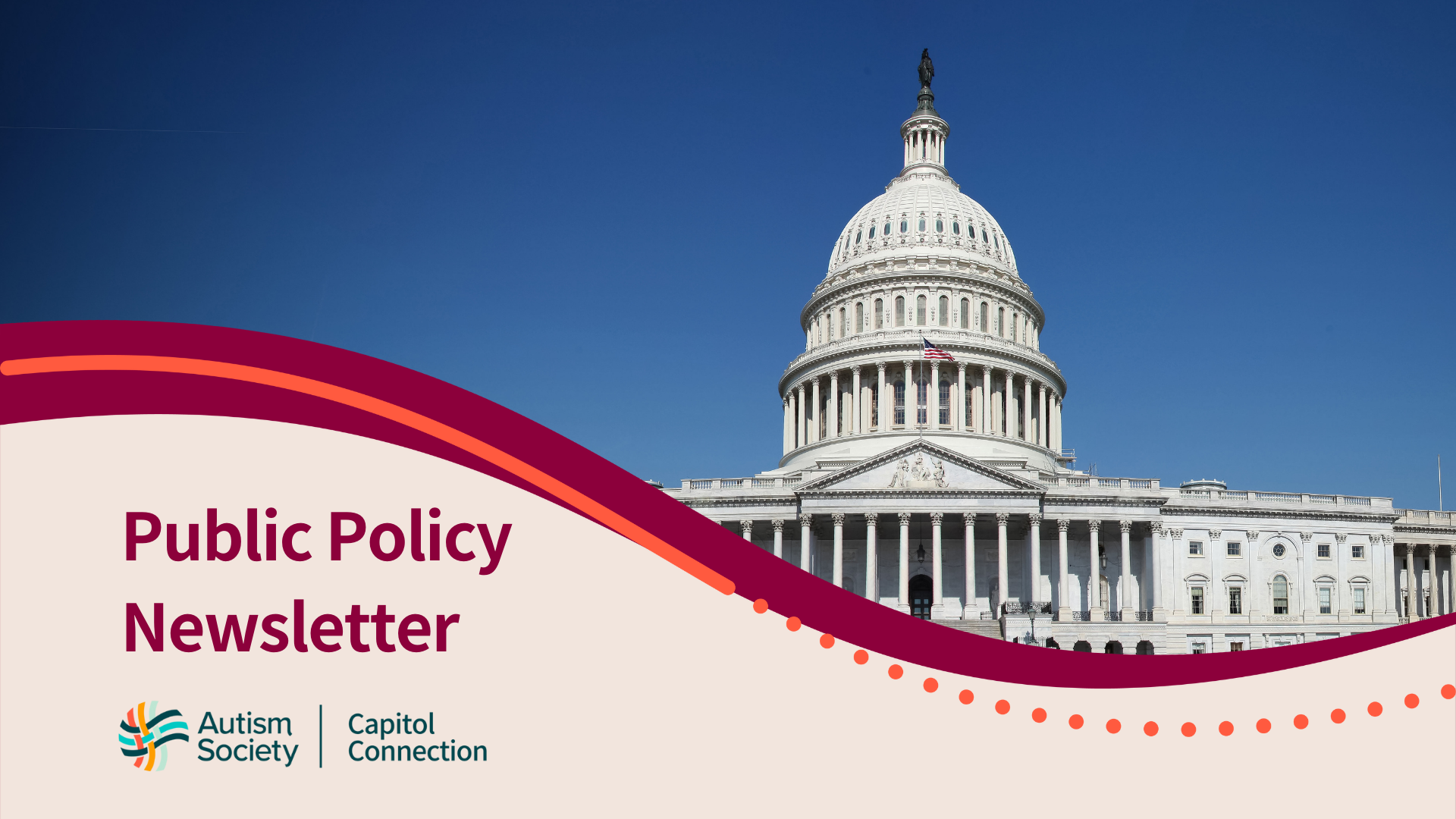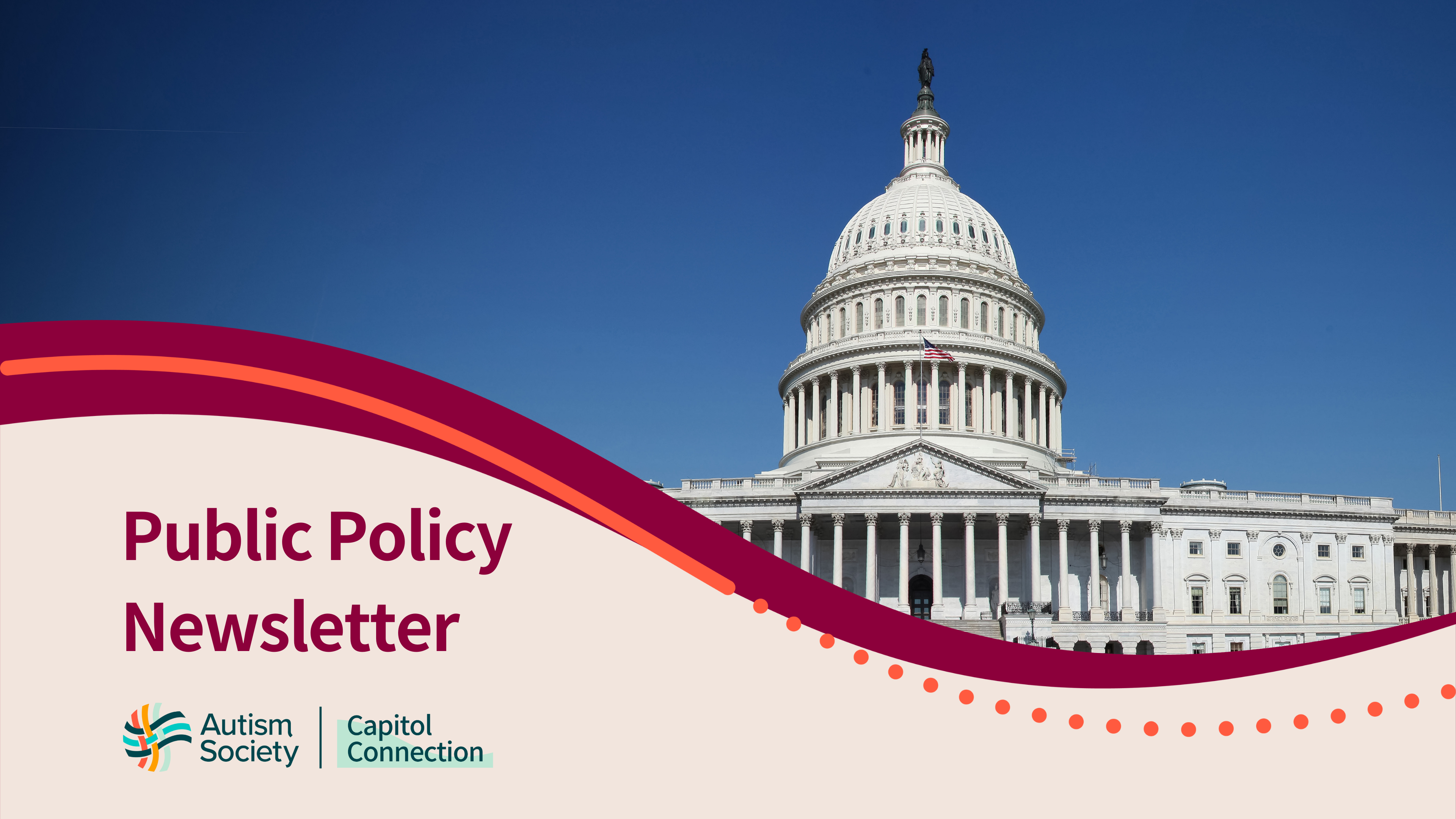
In this issue of Capitol Connection, find the congressional schedule for the last few days of Congress, an update on appropriations, a legal settlement on restraint and seclusion, and new resources from the Administration. Please continue to use the Autism Society’s online Action Center for voting information, links to disability-related legislation, and sample letters to educate Members of Congress.
Legislative Updates
Congressional Schedule
Congress has less than two weeks before they leave to campaign for the midterm elections. This means they are concentrating on “must-pass” legislation, such as appropriations for fiscal year 2013 that begins on October 1, tax extenders, reauthorization of the FDA, defense, and other bills that are considered urgent. Disability advocates are still pushing to finalize work on bills to reform SSI, reauthorize Kevin and Avonte’s Law, ABLE Age Adjustment Act, and an extension of Money Follows the Person program, among other priorities.
Appropriations
On appropriations, Congressional leaders have been discussing a short-term continuing resolution (CR) at level-funding that would expire on December 16. This would give them time to negotiate a package of all 12 spending bills in a lame duck session of Congress after the elections. Last week, negotiations on the CR stalled, as disputes over environmental permitting, coronavirus aid, disaster relief, and more created obstacles to a deal. This week, lawmakers hope to pick up the pace on a continuing resolution so that it can be passed before Congress recesses in October.
Direct Support Professionals Legislation
The Autism Society recently signed onto a letter from the Consortium for Constituents with Disabilities to urge Congress to support the Recognizing the Role of Direct Support Professionals Act (S. 1437). This bill would require the Office of Management and Budget (OMB) to revise the Standard Occupational Classification (SOC) system to create a distinct classification for direct support professionals (DSPs). The creation of an occupational classification for DSPs is a necessary first step in addressing a decades-long workforce crisis that threatens individuals with disabilities’ access to critical support and services through the Medicaid HCBS program. The Autism Society created an action alert to empower individuals to help educate Congress about this important issue.
DSP resource
In related news, a new report by PHI, a national organization supporting direct support professionals, found that the direct care workforce is the largest occupation and has major barriers that affect recruitment and retention. PHI found that in the last ten years, the workforce has grown by 1.5 million workers and will continue to grow at the same pace in the next ten years, with most of the growth expected to be in the home and community-based service sector. A disability advocacy group in New York found that the staffing crisis across the state is costing more than $100 million a year. The report found that the Government and Industry leaders must provide investments to support this growing workforce.
Administrative Updates
Public Charge
On September 8, the U.S. Department of Homeland Security (DHS) issued a final rule on the “public charge” regulation, restoring the rule to its original understanding of the public charge. The final rule makes important clarifications to exclude institutionalization for short-term rehabilitation and home and community-based services, and to ensure that people can safely enroll in Medicaid for health care services. It also confirms that eligible immigrant families can use other health care, nutrition, and housing programs without public charge concerns. The final rule takes effect on December 23, 2022.
NIH Awards $100 Million for Autism Centers of Excellence Program
The National Institutes of Health has awarded a total of $100 million over the next five years to support nine Autism Centers of Excellence (ACEs). These Centers conduct research on the diagnosis, cause, and interventions of Autism. They also focus on innovative services for individuals with Autism. The new grant money also prioritizes hiring researchers who are neurodiverse and underrepresented and ensuring Centers have an advisory board that includes the Autism community. Refer to this webpage to learn more about ACEs and programs that received grants.
Rehabilitation Services Administration Nomination
President Biden announced the nomination of Danté Allen as commissioner of the Rehabilitation Services Administration (RSA) at the U.S. Department of Education. Mr. Allen is currently the executive director of CALAble and oversees California’s ABLE Accounts. The RSA provides leadership and resources to assist state and other agencies in providing vocational rehabilitation and other services to individuals with disabilities to maximize their employment, independence, and integration into the community and the competitive labor market. The nomination is awaiting Senate approval.
State Advocacy Resources
Education
The Office of Special Education Programs (OSEP) under the United States Department of Education will be holding a webinar to discuss their recently released guidance package intended to help public elementary and secondary schools fulfill their responsibilities to meet the needs of students with disabilities and avoid the discriminatory use of student discipline. During this webinar, OSEP officials will provide a brief overview of the guidance package and will leave time for discussion and questions/answers. The webinar, “OSEP Guidance to Help Schools Support Students with Disabilities and Avoid Disparities in the Use of Discipline,” is scheduled for September 30th from 1-2 pm (EST). Register here.
Education Scorecard
In 2022, the National Center for Education Statistics (NCES) conducted a special administration of the National Assessment of Educational Progress (NAEP) long-term trend (LTT) reading and mathematics assessments for age 9 students to examine student achievement during the COVID-19 pandemic. Average scores for age 9 students in 2022 declined 5 points in reading and 7 points in mathematics compared to 2020. This is the largest average score decline in reading since 1990, and the first-ever score decline in mathematics. While disappointing, this trend is not unexpected given the huge disruption in services, especially for subgroups such as students with disabilities. In a Dear Colleague Letter to states and districts, Secretary of Education Miguel Cardona underscored the impact of the pandemic on student performance and said he “remains especially concerned about disproportionate impacts for students from low-income backgrounds, students of color, students with disabilities, multilingual learners, students experiencing homelessness, and migratory students.” The letter notes specifically that “while some education stakeholders would have preferred the Department waive assessment requirements (in reading and math) over the past two years, it was not the time to do so, just as now is not the time to lower standards for students.” Cardona also said that, when “used in the right way (the data)…can inform instruction and help school leaders drive resources to the schools and students that need them the most.”
Supporting Families/Affordable Connectivity Program
Autism Society attended an event with the White House focused on supporting families as they return back to school and was given resources on the Affordable Connectivity Program. This program provides families with $30 a month for internet as well as a one-time $100 discount on a device. To qualify, families must participate in at least one of these programs, including Free and Reduced-Price School Lunch, SNAP, Medicaid, SSI, or WIC. To learn more and apply, visit https://www.fcc.gov/acp.
Justice Department Iowa Restraint and Seclusion Settlement
The Department of Justice’s Civil Rights Division and the U.S. Attorney’s Office for the Northern District of Iowa announced a settlement agreement with the Cedar Rapids Community School District in Cedar Rapids, Iowa, to address the discriminatory use of seclusion and restraint against students with disabilities. The department’s investigation found that the school district inappropriately and repeatedly secluded and restrained students with disabilities as early as kindergarten in violation of Title II of the Americans with Disabilities Act (ADA). Under the agreement, the School District has voluntarily agreed to end the use of seclusion, reform its restraint practices, and improve its staff training on anticipating, appropriately addressing, and de-escalating students’ disability-related behavior through appropriate behavioral interventions.
The Department has committed to protecting students with disabilities from these unlawful practices as agreements have been reached in Maryland and Indiana over the last few years.
Restraint and Seclusion Resource
The Department of Justice published a new web page called Combating Improper Seclusion In Schools, which is available here. The purpose of the web page is to consolidate for families, students, and schools a number of resources aimed at preventing discriminatory use of seclusion, especially against students with disabilities. It also includes the reporting process and what the DOJ can do.
Transition Planning Course
The National Center for Learning Disabilities released a new transition planning course for students, young adults, families, and educators. The course for students and young adults focuses on self-advocacy and education on protections as one navigates post-secondary education or work options. The resource for families and educators reinforces the Individualized Education Plan transition planning and provides a facilitation guide.
Share:



